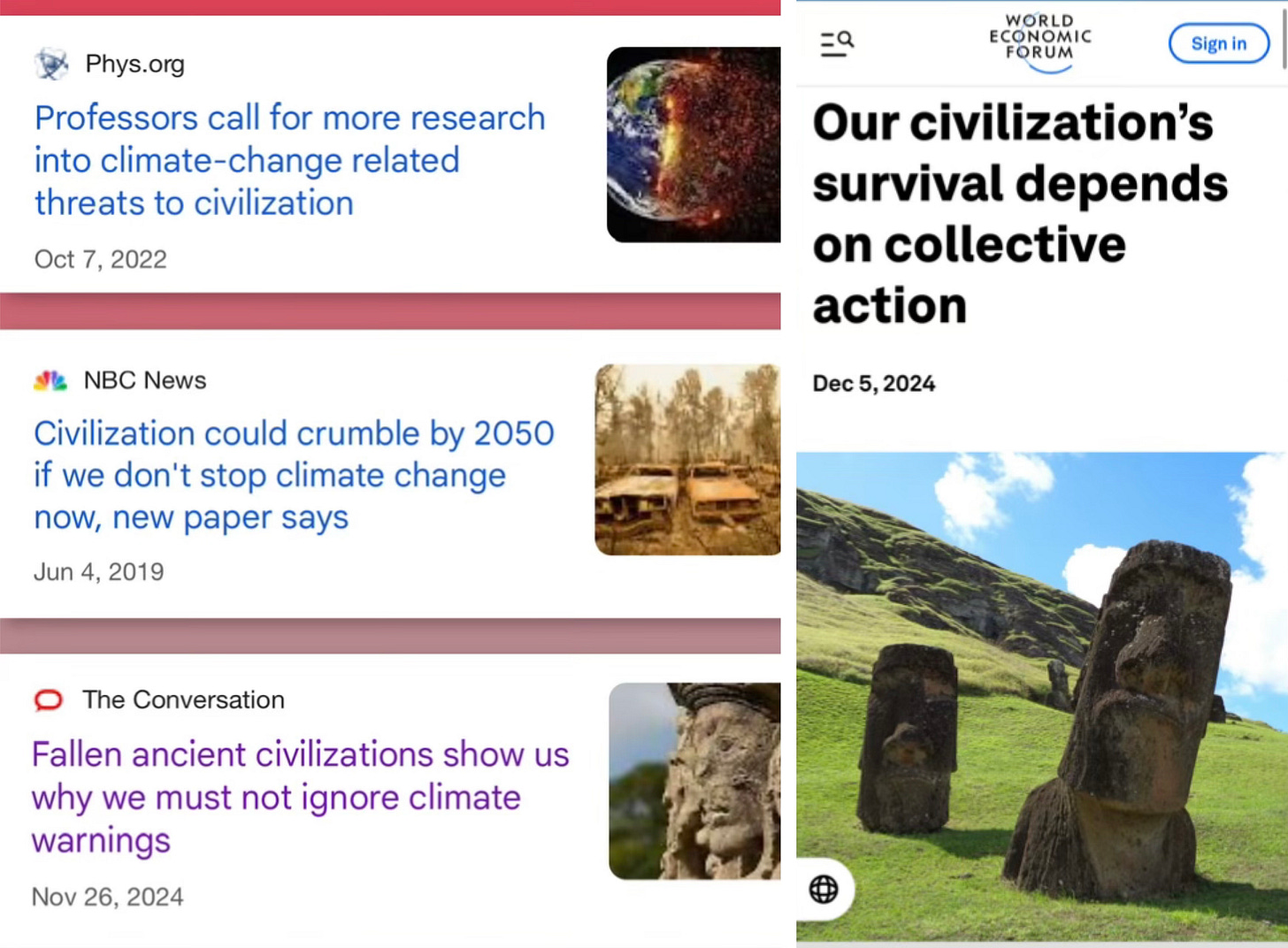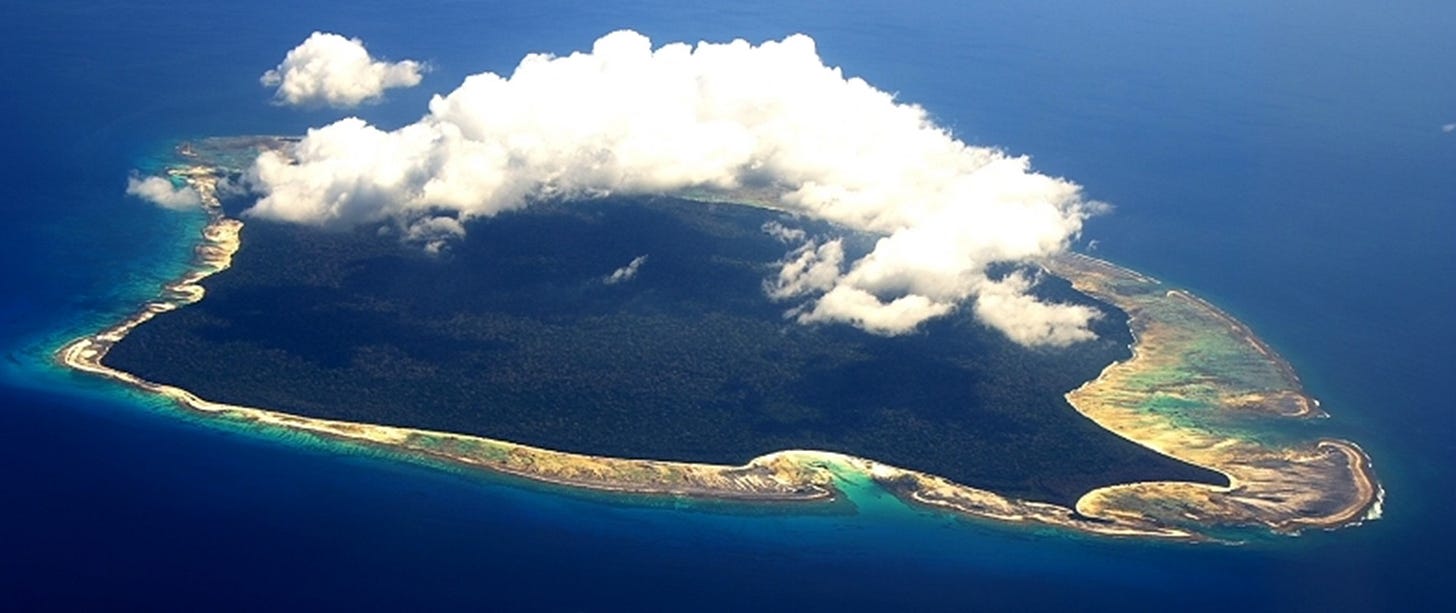Our Project Is Self-Contradictory
I’d like to address an aspect of recent discourse. I’ve noticed several variations on the following:
Civilization is a damsel-in-distress who can still be rescued.
Civilization could function well … if only the right people were leading it, if only the right machinery were powering it, if only the right economic model were in place.
Civilization is the victim but not necessarily also the perpetrator.
The statements and headlines above don’t quite represent our situation accurately.
Nothing in the Universe is permanent. Therefore, the more relevant question to ask is, “How impermanent are the current circumstances?” Accordingly, rather than referring to things in the black-and-white terms of "sustainable or unsustainable?”, we might do better to speak in terms of "life expectancy".
Between fifty and two hundred people have inhabited North Sentinel Island, essentially uncontacted, for 60,000 years. Observing the same rules for ecological harmony that most other species do, they’ve mostly limited what they take from their environment to calories. Granted, they use materials for shelters and tools, but this is relatively modest. The environment is able to spare the materials, little harm is done and they regenerate in good time. As a result, the island is covered in abundant, diverse life.
In an alternative model, a portion of humans works overtime to secure calories for everyone, through intensive agriculture. This activity includes preventing other species from accessing "our" calories on an ever-expanding territory. Meanwhile, the remaining portion of the population, being exempt from investing their time and energy toward meeting the collective’s basic survival needs, devote their efforts to ultra-specialized full-time roles, erecting mega-infrastructure (pyramids, temples, the Colosseum, factories, highways, cities, solar arrays). They convert landscapes into human-centric spaces. This makes possible population density, mega-institutions, long-distance supply chains of "products" and services that are far beyond other animals' experience. I've read authors suggest that this behavior is peculiar enough that we should now be considered a distinct species - Homo colossus (William Catton) or Homo sapiens agriculturii (Lisi Krall).
(Aside: I use the term “civilization”, but "empire” could be appropriate too. We tend to use “empire” for the Egyptian Empire, Roman Empire, Mongol Empire - yet for the most recent iteration, globalized techno-industrial modernity, we’ve stopped referring to ourselves as an empire. Maybe an empire is obvious only when there are places that it hasn’t yet reached. Anyway, I think “civilization” is something of which we are proud and protective, so I invoke it to challenge this.)

Environmental devastation is how a civilization emerges and maintains itself. This is always the basis for our “civilized” notion of Human Progress, although we rarely acknowledge the trade-off. It’s a toxic, out-of-control form of cooperation that promotes excessive resource extraction. Tom Murphy is spot-on with the term "metastatic". This is a freak mutation. Like a cell that abandons its harmonious niche in the body, we overstep and produce anthropogenic anthropocentric abiotic scabs all over the planet.
That’s our culture’s modus operandi. Previous civilizations went through this dozens of times on a regional scale, and now we’re doing it on a global scale. It becomes easy to ignore or dismiss the Human Supremacy Show’s peculiarity, its context and its consequences. The damage occurs farther and farther from the empire’s “core”. We get better at telling mesmerizing myths to assuage our consciences and to keep inhabitants of the empire’s “periphery” compliant (see: the UN’s Sustainable Development Goals for the Global South).

The project of operating as a civilization is self-contradictory. It demands too much of its own environment. If your culture’s daily routine entails decimating its own life support, you can’t expect to survive long. This creates a multitude of problems, more than it can ever keep up with. Our Designed World is now starting to malfunction. The damage it has done all along to its surroundings is starting to inhibit its operation. More extraction and layers of complexity will make our crises worse, not better. Conversely, without extraction and complexity, a civilization’s activities grind to a halt. This is why the most appropriate descriptor for what we face is not “problem” but “predicament”. For civilization-as-behavior, there’s no way out.
How many degrees above the pre-industrial temperature will the planet be in 2100?! Will species X go extinct? The fates of certain things on Earth are yet uncertain, but civilizations’ fate is. This particular phenomenon burns bright but has a very short wick. It is determined at the moment of a civilization’s inception that it will last no more than a few hundred years.
This remains true regardless of political party, power source or economic model. Nothing can “save civilization”. Civilizations are only ever created and maintained through destruction, so their peak and decline are guaranteed, and never far behind.





I’m just reading Overshoot now and getting my head around it all. Your article sums up nicely a terrible thing. Thank you for writing this piece.
You make excellent points, in a very well-written way.
Two minor objections- "we" don't have the socio-political power to determine anything about collapse, contrary to the starry-eyed Joanna Macy.
And we shouldn't use terms that are completely antithetical to reality.
There is no "democracy," that is, the socio-political rule of the common people. Voting occurs in a a process dominated by dark corporate money in the US, given full autonomy in the Citizens United ruling. Business and industry rule that process. from top to bottom.
Otherwise, great piece.